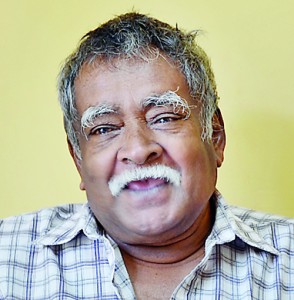Sarath, the humanist, fought for farmers and peasants
I can’t remember when I first met Sarath (Fernando – who was laid to rest last week along with another great son of the soil, Bala Tampoe) but it was probably around the time in the late 1990s when I began writing on development issues.
It was an interesting period – the new regime (Chandrika Kumaratunga’s team) had taken over, climate change and global warming were just getting into the world agenda, the environment was getting attention in New York and Geneva (halls of the United Nation), gender was becoming a vocal issue.

Sarath
Activists like Sarath and others like environmentalist Jagath Gunawardena (environment), lawyer J.C. Weliamuna (human rights), sociologist Siripala Hettige (discipline and values), Jehan Perera, A.T. Ariyaratne and his son Vinya, (late) David Soysa (migrant workers), (late) Bala Tampoe and Anton Marcus (trade unions), Nimalka Fernando (rights), (late) Sunila Abeysekera (rights and women’s’ issues ) and scores of others from the North and the East including Prof. Daya Somasunderam (a top northern psychiatrist) were just a call away for a quick quote, long conversation or an occasional meeting when time permitted.
Those were the heady days when comment (to some extent) was free and people were willing to express a strong view, irrespective of the consequences. Many of those conversations, in fact, helped me in my own pursuit as a journalist-activist. It was a pleasure listening to Sarath talk on farmers, the land they tilled, their forefathers, organic farming, agriculture policies and so on. Many of these conversations helped me to understand these simple folk and the struggle to go through the Maha and Yala harvests and in desperation persuading their children to continue the farming tradition (which many opted against hoping for a more ‘dignified’ job than dress in a loin cloth and work the fields). This was a time when young people from the village joined the armed forces in the fight against the LTTE and other armed combatants. From farmers to economists, policy makers to corporate bosses, Sarath had a knack of speaking their language and communicating in the simplest of form to counter their arguments in a gentle manner. He was a mild mannered individual though his bushy moustache, a trademark among his brothers too, belied the small frame that cut ‘to the chase’ at many important gatherings. We had many conversations as I often called Sarath for a quote on issues relating to social justice, development and governance. His forte however was agriculture, the rights of farmers, globalization. Even at our last meeting in early July this year when his organisation, MONLAR (Movement for National Land and Agricultural Reform) featured Indian thinker, philosopher and farmers’ right advocate Dr. Vandana Shiva at a Colombo event opposing the Seed Act which farmers say would force them to import seeds from powerful seed companies in the world like Monsanto, Bayer or DuPont; he was forthright in his views.
On that occasion, he looked frail but spoke from the heart and his life-long mission – to seek justice for peasants and farmers. He was a typical, down to earth Sri Lankan constantly (or as far as possible) staying at his hometown in Kurunegala and travelling to Colombo, often by bus.
There are several quotes from Sarath (I would like to repeat here) from the many stories I wrote that reflected his vision and standpoint. Here are a few:
n In a 2011 story on a coconut crop shortfall and Sri Lanka being forced to import nuts: “The government is banning the felling of coconut trees when it should have been done long time ago. This is like shutting the stable door after the horse has bolted.” – Sarath
n In a 2007 story when the IMF closed its Sri Lanka office (only to reopen in October 2009 when the Government secured a bail-out package): “Many countries like Thailand have stopped borrowing from IMF and also the IMF has less money to lend. The Fund’s conditions, over and over again, are not being followed and hasn’t got civil society acceptance. For decades these prescriptions haven’t worked. It has only led to the poor subsidising the rich through grand infrastructure building of new airports and ports. The Washington-based agencies say they have consulted the people but the people who raised the questions have been ignored.” Sarath.
In a recent editorial about the anti-seed campaign, I wrote, “The saga of seeds will inevitably end up in the weeds of corruption if the good people of Sri Lanka don’t stand together against TNCs bent on profit and personal glory rather than the interests of the people at heart.” Sarath, in all his goodness, reached out to the ‘good people of Sri Lanka”. I hope his legacy remains. The good people of Sri Lanka will miss you, my friend.
- Feizal


